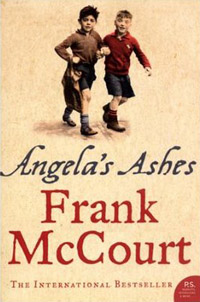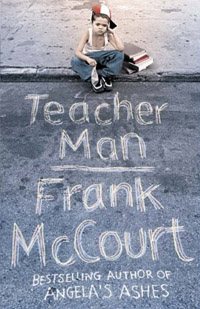
Frank McCourt ended his career as a teacher of creative writing without having written a single book. They would only come afterwards. Reading Teacher Man, one would think that it was through his pupils that he learned that the best stories are often hidden behind everyday events.
His students tended to understimate their own experiences as writing material. Who cares about my life, they would think. In this monographic week devoted to McCourt we will review some of the scenes these young boys and girls shared in his class, and we’ll dig for those stories that McCourt brings to us even though their own protagonists could not see them.
But today we’ll talk about McCourt himself and where he found his stories. I might spoil some details, but the books are portraits and not plot-oriented, so I hope you’ll forgive me. Last Friday I already summarized what each novel is about – they’re all strictly autobiographical. But there’s a nice detail that weaves them together.
The first novel ends when, after many tribulations, teenage Frank finally manages to find a passage out of Ireland.
I stand on the deck with the Wireless Officer looking at the lights of American twinkling. He says, My God, that was a lovely night, Frank. Isn’t this a great country altogether?
‘Tis.
With this last sentence, McCourt (the author and the character) makes an assertion which is a wish: that it be, that America will be the promised land he’s longed for. Those two words encompass a whole story, from the hoping to the checking and we don’t know if to realization or disappointment. That’s why these two words are the title of the sequel, which tells this story.
Last week I finished the third volume, Teacher Man, whose ending follows a similar pattern. After teaching his final class before retiring, as he walks away along the corridor, a voice calls:
Hey, Mr. McCourt, you should write a book.
After passing the page, the final chapter reads:
I’ll try.
Isn’t that sentence a wohle story? That could have been the title of a fourth volume telling the event after his retiring, the process of writing Angela’s Ashes and getting it published, the massive reception, the success, the incredulity of the author himself, encoumbered from high school teacher to media star. Isn’t that quite a story? Frank McCourt knew how to find it, and surely only his demise kept him from telling it.
Death will be a recurring theme this week. For now, start ordering these books and asking yourself if your life couldn’t be good enough for several novels as well.


Cualquier experiencia vivida, por insignificante que nos parezca, puede ser la simiente de un relato, incluso de una novela. Depende del buen oficio del autor y que éste sepa sacarle punta. En una ocasión leí que un buen escritor es como el fotógrafo que es capaz de plasmar en una instantánea lo que no somos capaces de ver aunque pasemos por delante de esa iglesia, paisaje, plaza… todos los días. El buen narrador es aquel que es capaz de transformar lo cotidiano en algo único y sorprendente, es decir, mostrarnos aquellos matices de la realidad que no somos capaces de… Leer más »
¡Me ha encantado esa comparación con el arte fotográfico!
(Millás es otro que por mi parte sigue virgen)